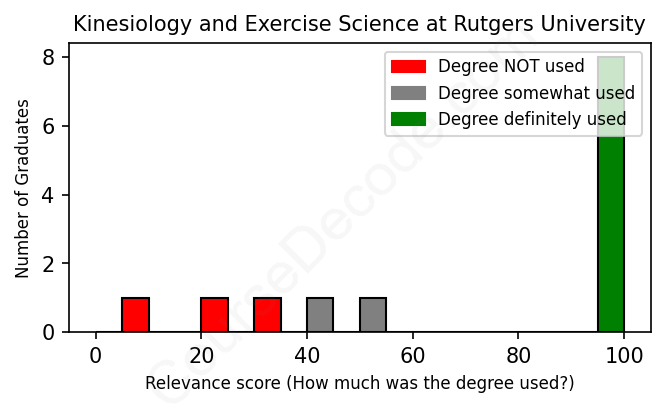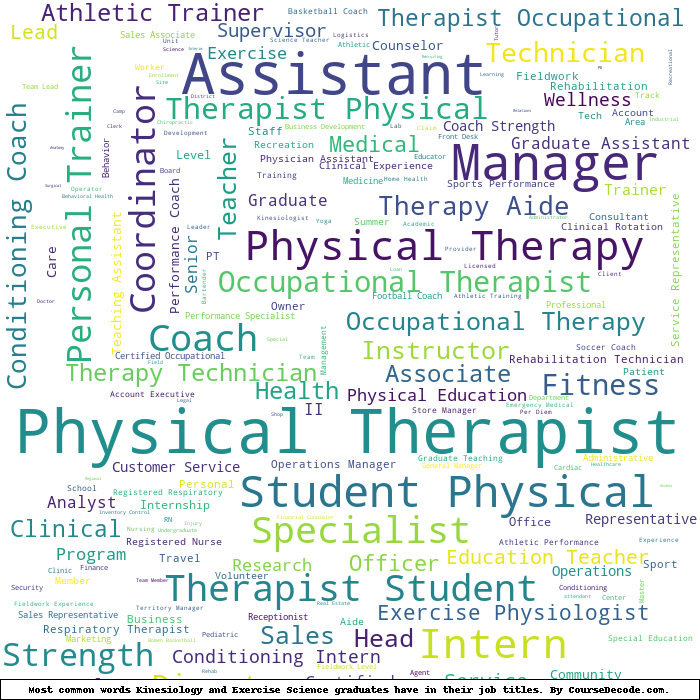
First, some facts. Of the Kinesiology and Exercise Science graduates from Rutgers University we've analyzed , here's how many have used (or NOT used) their degree in their career:

These are estimates based on AI analysis of 13 LinkedIn profiles (see below).
The verdict? Above average. Overall, with an average relevance score of 73%, Kinesiology and Exercise Science graduates from Rutgers University have a higher likelihood (+6%) of finding work in this field compared to the average graduate across all fields:
And for comparison, here's the chart for all profiles we've looked at across all degrees.
Also, after graduating, 53% of these graduates have pursued further education other than another Bachelor's degree (such as a Masters degree or other), compared to the average across all profiles of 35%. This suggests you may need more than just a Bachelors degree to be competitive as a Kinesiology and Exercise Science graduate.
See the details:
|
Relevance score: 52% We think this person has gone into a career only somewhat relevant to their degree. We think this person has gone into a career only somewhat relevant to their degree.
DEGREE INFOGraduated in 2021 from Rutgers University with a Bachelor of Applied Science - BASc in Kinesiology and Exercise Science. No other secondary education since. JOB HISTORY SINCE GRADUATIONBehavioral Health Technician Bierman Autism Centers Jun 2021 - Jun 2024 Case Management Specialist  Massachusetts General Hospital Jun 2024 - Present ABOUTNo information provided. |
The top 10 most common jobs done by the graduates we've analyzed (ranked most common to least) are:
Based on the LinkedIn profiles analyzed, it seems like the most common types of jobs for graduates with a degree in Kinesiology and Exercise Science from Rutgers University are centered around physical therapy and fitness. Roles such as Physical Therapy Aides, Personal Trainers, and Exercise Physiologists appear frequently, and these positions are highly relevant to their studies. They involve applying principles of human movement, exercise techniques, and rehabilitation practices, which are all core aspects of Kinesiology and Exercise Science. Many graduates clearly found a path that aligns well with their educational background and allows them to use their knowledge in real-world settings.
However, it's also noticeable that a significant number of alumni ventured into roles that are not directly related to Kinesiology and Exercise Science. Positions like Office Coordinators, Sales Consultants, and even Freelance Photographers reflect a shift away from the core focus of their degree. These jobs often lack the application of the technical and scientific principles that are taught in their programs. Overall, while many graduates found fulfilling careers that leverage their expertise, a considerable portion ended up in unrelated fields, showcasing a mix of both relevance and divergence in their career paths.
Here is a visual representation of the most common words in job titles for Kinesiology and Exercise Science graduates (this is across all Kinesiology and Exercise Science graduates we've analyzed, not just those who went to Rutgers University):

When looking at the career trajectories of Kinesiology and Exercise Science graduates from Rutgers University, there’s a mix of paths that students have taken since leaving school. Many seem to start their careers in practical roles directly related to their degree, such as physical therapy aides or personal trainers. For instance, several graduates from 2014 to 2018 turned out to be physical therapy aides after graduation, suggesting that entry-level jobs in rehabilitation and exercise support services are common. It seems like the first job is often in a position that allows them to gain hands-on experience within the healthcare and fitness fields, which is a great way to kick off a career related to their studies.
As you look at the trajectories five or ten years down the line, there's quite a bit of variation. Some graduates transition into broader roles, getting into areas like sales or office management, which might not feel closely tied to Kinesiology or Exercise Science. However, there are also encouraging examples of individuals moving into roles like exercise physiologists and occupational therapists. This shows that while some may veer off into less relevant fields, a substantial number stick to their roots in health and fitness. Overall, it looks like graduates have a fair shot at building promising careers in their field, but it’s clear that not everyone ends up in a job closely linked to their degree over the long term.
Honestly, a Bachelor’s degree in Kinesiology and Exercise Science can be a mixed bag, depending on your interests and strengths. At Rutgers University, like at many schools, you’ll encounter some challenging courses, especially in areas like anatomy, physiology, and biomechanics, but if you’re really into sports, fitness, and understanding how the body works, it might feel more like a fun challenge than a grind. It's not exactly the easiest degree out there, but it's not the hardest either—so if you have a passion for the subject, you’ll probably find yourself enjoying the ride more than anything else. Just be ready for a bit of science-heavy coursework alongside some practical applications!
Most commonly, in the LinkedIn profiles we've looked at, it takes people 4 years to finish a Bachelor degree in Kinesiology and Exercise Science.
Looking at these graduates from Rutgers in Kinesiology and Exercise Science, it seems like some of them are doing pretty well while others are still figuring things out. Those who landed roles in sales or as consultants, like the ones from the Class of 2015, are likely making decent money, especially in the medical field, where positions can be quite lucrative. On the other hand, roles like physical therapy aides and personal trainers that some of the newer grads have taken, typically start on the lower end of the pay scale. So, it looks like there’s a mix here—some graduates are on a solid financial path, while others might need a few more years under their belt to really boost their earnings. Overall, it seems like there's potential, especially as these graduates gain more experience in their fields!
Here is a visual representation of the most common words seen in the "about" section of LinkedIn profiles who have a Bachelor degree in Kinesiology and Exercise Science (this is across all Kinesiology and Exercise Science graduates we've analyzed, not just those who went to Rutgers University). This may or may not be useful:

Here are all colleges offering a Bachelor degree in Kinesiology and Exercise Science (ordered by the average relevance score of their Kinesiology and Exercise Science graduates, best to worst) where we have analyzed at least 10 of their graduates: